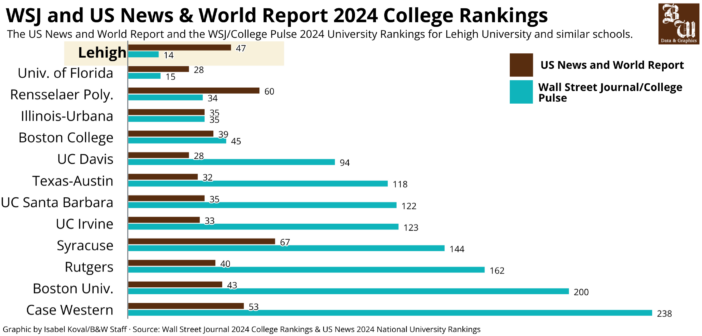Lehigh was recently ranked as the 14th best college in The Wall Street Journal’s “2024 Best Colleges in the U.S.” study. This was Lehigh’s highest ranking on the list to date.
Ranked at No. 14, Lehigh was placed above multiple Ivy League universities and other prestigious schools offering four-year undergraduate degrees.
Dan Warner, vice provost of admissions and financial aid, said he was gratified but not surprised to see Lehigh’s spot on the list, especially after taking The WSJ’s updated methodology into account.
With the assistance of the research institutions College Pulse and Statista, The WSJ 2024 list heavily factored post-graduation outcomes in its ranking process.
The WSJ broke down each score into three categories: student outcomes, learning environment and diversity. They were weighed based on what was deemed most impactful to a student’s college experience.
Student outcomes of the school comprised 70% of the score, learning environment made up 20% and diversity encompassed 10%.
Lehigh scored highest in the “Student Outcomes” section of the ranking, with its salary impact compared to similar colleges given the university’s highest rating of 99/100. The graduation rate compared to similar colleges was given Lehigh’s second-highest score of 89/100.
Director of Admissions Bruce Bunnick said the overall ranking reassured one of the university’s central messages to potential applicants.
“We’ve been promoting the long-term benefits of a Lehigh education to our prospective students for quite some time,” Bunnick said. “This survey helps to validate but should be part of a larger investigation of the university among prospective students.”
The admissions office follows, but does not closely monitor or attempt to predict, Lehigh’s positioning in national lists, Bunnick said. He said admissions understands arbitrary rankings are just a piece of the puzzle for possible applicants.
Bunnick said they question how heavily applicants weigh The WSJ and other reports.
The Early Decision I application deadline is on Nov. 1, while Early Decision II and Regular Decision applications are required by Jan. 1.
Warner said it’s difficult to predict the ranking’s impact on the number of applications Lehigh receives, but he thinks this will increase the number in a positive way.
“Anytime that we have third-party independent confirmation of the things that we are putting forward as strengths of the university, it just helps to lend some credibility to those things that we are celebrating,” Warner said.
While Lehigh was positioned highly by The WSJ because of standout factors like post-graduate outcomes, it fell behind in certain metrics such as diversity, where it received a rating of 46/100, Lehigh’s lowest personal score.
The WSJ used metrics such as opportunities to interact with students of different backgrounds, inclusion of students with disabilities and students of lower family earnings, and ethnic and international diversity to formulate this score.
Warner said Lehigh is committed to improving diversity across all boundaries in response to The WSJ’s unfavorable score.
In recent months, Lehigh has made public efforts to address diversity and inclusion in its socioeconomic makeup, specifically on Oct. 3 when it announced a plan for free tuition to students with families making under $75,000 a year.
Sterling Salmini, ‘24, vice president of communications for the Lehigh Student Senate, said he was pleasantly surprised with the ranking, especially in comparison to Ivy League schools.
“Not to say that Lehigh does not have prestige, but it’s definitely seen as more of a work hard/play hard school with a lot of good financial opportunities,” Salmini said.
He said it provides validation and motivation for the entire university, and he hopes this serves as a reminder to students and the university to keep striving for improvement.
“Especially Lehigh’s administration, it could serve as a reminder to really keep investing in these programs,” Salmini said. “Because it’s the investment in the programs that leads to these really good student outcomes.”






Comment policy
Comments posted to The Brown and White website are reviewed by a moderator before being approved. Incendiary speech or harassing language, including comments targeted at individuals, may be deemed unacceptable and not published. Spam and other soliciting will also be declined.
The Brown and White also reserves the right to not publish entirely anonymous comments.